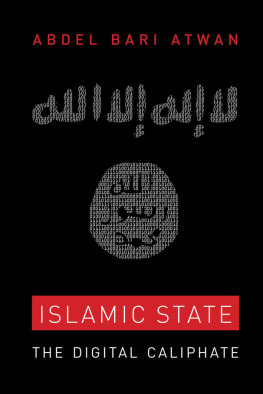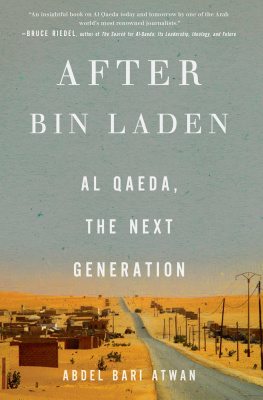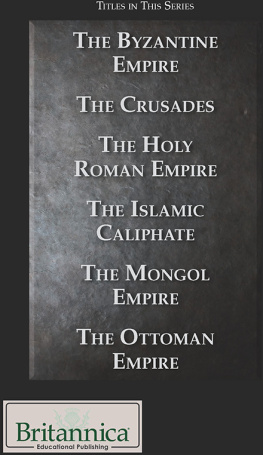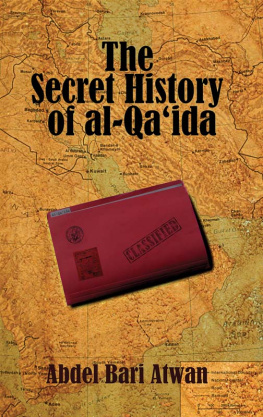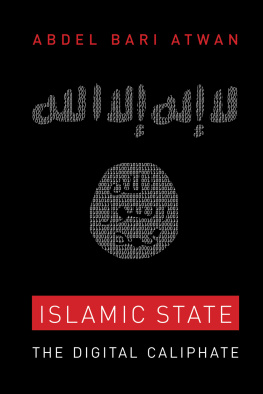Abdel Bari Atwan - Islamic State: The Digital Caliphate
Here you can read online Abdel Bari Atwan - Islamic State: The Digital Caliphate full text of the book (entire story) in english for free. Download pdf and epub, get meaning, cover and reviews about this ebook. year: 2015, publisher: University of California Press, genre: Religion. Description of the work, (preface) as well as reviews are available. Best literature library LitArk.com created for fans of good reading and offers a wide selection of genres:
Romance novel
Science fiction
Adventure
Detective
Science
History
Home and family
Prose
Art
Politics
Computer
Non-fiction
Religion
Business
Children
Humor
Choose a favorite category and find really read worthwhile books. Enjoy immersion in the world of imagination, feel the emotions of the characters or learn something new for yourself, make an fascinating discovery.
- Book:Islamic State: The Digital Caliphate
- Author:
- Publisher:University of California Press
- Genre:
- Year:2015
- Rating:4 / 5
- Favourites:Add to favourites
- Your mark:
- 80
- 1
- 2
- 3
- 4
- 5
Islamic State: The Digital Caliphate: summary, description and annotation
We offer to read an annotation, description, summary or preface (depends on what the author of the book "Islamic State: The Digital Caliphate" wrote himself). If you haven't found the necessary information about the book — write in the comments, we will try to find it.
Islamic State: The Digital Caliphate — read online for free the complete book (whole text) full work
Below is the text of the book, divided by pages. System saving the place of the last page read, allows you to conveniently read the book "Islamic State: The Digital Caliphate" online for free, without having to search again every time where you left off. Put a bookmark, and you can go to the page where you finished reading at any time.
Font size:
Interval:
Bookmark:
ALSO BY ABDEL BARI ATWAN
The Secret History of al Qaeda
After bin Laden: Al Qaeda, the Next Generation
A Country of Words: A Palestinian Journey from the Refugee Camp to the Front Page
ABDEL BARI ATWAN

UNIVERSITY OF CALIFORNIA PRESS
University of California Press, one of the most distinguished university presses in the United States, enriches lives around the world by advancing scholarship in the humanities, social sciences, and natural sciences. Its activities are supported by the UC Press Foundation and by philanthropic contributions from individuals and institutions. For more information, visit www.ucpress.edu.
University of California Press
Oakland, California
2015 Abdel Bari Atwan
Library of Congress Cataloging-in-Publication data is on file with the Library of Congress.
ISBN 978-0-520-28928-4 (cloth)
ISBN 978-0-520-96403-7 (ebook)
Manufactured in the United States of America
24 23 22 21 20 19 18 17 16 15
10 9 8 7 6 5 4 3 2 1
In keeping with a commitment to support environmentally responsible and sustainable printing practices, UC Press has printed this book on Natures Natural, a fiber that contains 30% post-consumer waste and meets the minimum requirements of ANSI/NISO Z 39.48-1992 ( R 1997) (Permanence of Paper).
I dedicate this book to the souls of my parents, Zarifa and Mohamed Abu Atwan. It is my hope and belief that they would be very proud of this work if they were alivethough they never received the education that would have allowed them to read it.
On July 1, 2014, a twenty-minute audio recording by Islamic States leader, Abu Bakr al-Baghdadi, was released across extremist websites and social media platforms. He declared a new caliphate and announced he would be its caliph.
Without digital technology it is highly unlikely that Islamic State would ever have come into existence, let alone been able to survive and expand. This is why I choose to describe the new entity as a digital caliphate. Islamic State has been able to encompass a territory the size of Great Britain as a result of a perfect storm of political, historical, cultural, and technological circumstances. From recruitment and propaganda to directing simultaneous military actions at great distances apart and consolidating allegiances with like-minded groups, IS has used the Internet and digital communications with great skill and inventiveness, competently fending off threats from global intelligence bodies and military opponents.
In January 2015, Islamic State declared cyberwar on the US government, with its Cyber Caliphate division hacking into the CentCom is the Pentagon division responsible for Middle East strategy and operations, and the jihadists triumphantly disseminated sensitive information, including the names and addresses of military personnel. Soon, cloud links to CentCom files were shared, quickly going viral across jihadist social media platforms, where they were downloaded and archived.
It is paradoxical, of course, that a group whose expressed aim is to take the world back to the days of the Righteous Caliphs (the first generations of Muslims) should be so dependent on the most sophisticated and modern technology; but in war, people use every weapon at their disposal. Besides, its leaders and foot soldiers are twenty-first-century meneven the gray-bearded Caliph Ibrahim himself was born in 1971. Most have never known a world without the Internet, and have been brought up with computers, mobile phones, and social networking platforms as part of their natural environment.
Other extremist Islamist groups are apprised of Islamic States successes by digital means, and most have transferred their allegiance to Baghdadi. Where possible, allegiance is given in person, or via an intermediary, but, increasinglyfor security reasonselectronically. In terms of audience, such groups can address hundreds of thousands, if not millions. Not only that, they acquire their own select audience; only those who are already interested for one reason or another will like a Facebook page, join a group on Ask.fm, or follow on Twitter. Conformity of message and a shared religious zeal are essential ingredients for expanding a caliphate, or indeed any state institution predicated on ideology. The Internet allows millions of Muslims to stay on message, hear the same sermons, view the same video messages, and witness the same punishments simultaneously.
Islamic State is the latest, most deadly incarnation of the global jihad movement established by Osama bin Laden and Ayman al-Zawahiri in 1998. Yet the digital caliphate is no mere virtual reality. It has a very real geographical, territorial presence. In traditional
Under International Law the criteria for statehood are relatively simple. The 1933 Montevideo Convention on the Rights and Duties of States concluded that there are two types of statehood: the declaratory and the constitutive. The former requires that, in order to declare itself a state, the entity must have a clearly defined territory, a permanent population, and a government capable of exercising authority over the population, its territories, and its resources. Montevideo also determined that declaratory statehood is independent of recognition by other states. Constitutive statehood, by contrast, requires recognition by existing states; but this has proved untenable, since there is no official international body with the authority to recognize states on behalf of the entire world community of states. (The UN cannot do this.) The authority exercised by government is generally accepted to include a judicial system and the capacity to engage in international relations with foreign states. The political or ideological tenets of a state are not prescribed, and at the moment, our planet boasts democratic and theocratic states, dictatorships and kingdoms.
In January 2015, the Institute for the Study of War released new maps showing the extent of territory controlled by Islamic State. Despite ongoing bombardments by the US-led alliance, it had continued to expand and now controlled almost half of Syria and at least one-third of Iraq.240,000 square miles. By way of comparison, the whole of the UK (including Northern Ireland) is less than 3,000 square miles bigger. The population under Islamic State control currently numbers at least six millionlarger than many European countries, including Denmark and Finland. That they are willing citizens of the state is not stipulated under international law.
In October 2014, Islamic State announced online that it had struck its own coinage, reviving the silver and golden dinars of the First Caliphate, and that this is now the official currency of the state. In January 2015, it opened its own bank in Mosul, offering Islamic loans (it is haram [sinful] to charge interest) and a facility for exchanging damaged notes. It also has its own car number plates, police force with brand-new, freshly painted police cars, uniform, and flag.
Although it may at some point in the future seek international recognition (as did the Taliban), Islamic State is unlikely to be particularly concerned with the demands and principles of international law, believing that its moment has come. The Salafists (who adhere to the earliest versions of Islam) have a vision of history that sees a period of ignorance ( Jahiliyyah ) followed by an Islamic stage. They believe that the world has been in a state of ignorance from which it can only emerge through three steps: faith (Salafist Islam); hijra (the migration of Muslims from infidel countries to communities of the faithful); and jihad (struggle to establish an Islamic state for the ummah , or nation). All Islamic State propaganda focuses on these three stages. The migration of large numbers of foreign fighters to join its cause is a crucial aspect of its online PR and recruitment material. Online videos often show joyful new arrivals burning their passports. The jihad stage has been under way for the best part of two decades, and Baghdadi and his followers are clearly convinced that the momentum for re-establishing the caliphate is now unstoppable. This is why they have confidently declared an Islamic State (although rival organizations such as al Qaeda believed the declaration was premature).
Font size:
Interval:
Bookmark:
Similar books «Islamic State: The Digital Caliphate»
Look at similar books to Islamic State: The Digital Caliphate. We have selected literature similar in name and meaning in the hope of providing readers with more options to find new, interesting, not yet read works.
Discussion, reviews of the book Islamic State: The Digital Caliphate and just readers' own opinions. Leave your comments, write what you think about the work, its meaning or the main characters. Specify what exactly you liked and what you didn't like, and why you think so.

